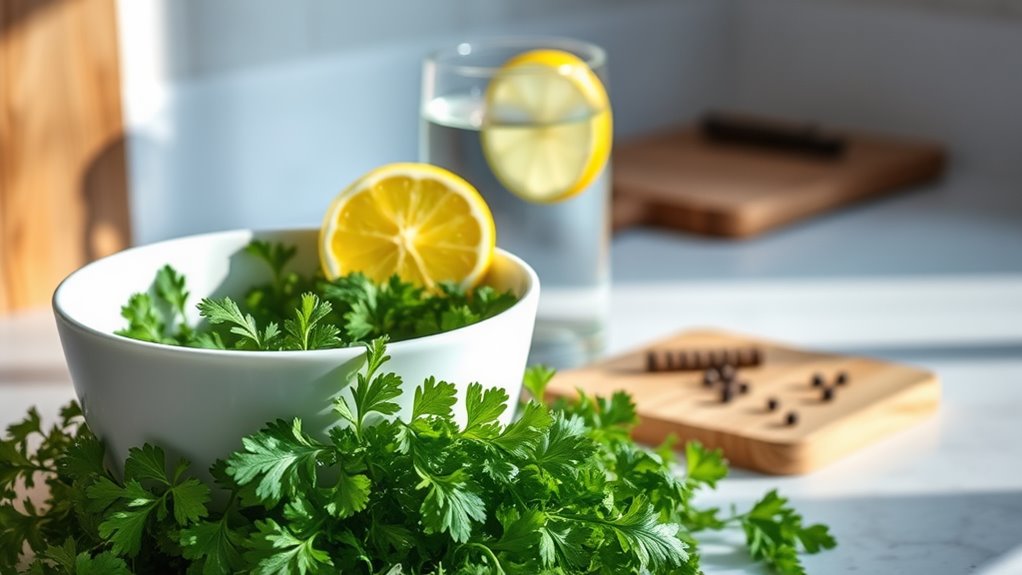Bloating and Gas Relief Using Ingredients From Your Pantry
If you’re dealing with bloating and gas, try ingredients right from your pantry. Ginger stimulates digestion and can be added to meals or made into tea. Peppermint tea relaxes your gut, while fennel seeds help expel gas. Mixing apple cider vinegar with water aids digestion and balances stomach acidity. Don’t forget yogurt for its probiotic benefits, and baking soda can help neutralize excess acid. There’s plenty more you can do to alleviate discomfort, so keep exploring!
Understanding Bloating and Gas
When you experience bloating and gas, it’s often a sign that your digestive system is struggling to process certain foods or ingredients.
Common culprits include high-fiber foods, dairy, and artificial sweeteners.
To ease discomfort, consider incorporating bloating natural fixes like peppermint tea or a gentle walk. Yogurt can also support overall wellness and improve gut health when included in your daily diet.
Staying hydrated and mindful of your eating habits can also support your digestive health effectively.
Ginger: A Natural Digestive Aid
Ginger can be a powerful ally in your quest for digestive relief, as it contains compounds that stimulate digestion and reduce gas.
You can easily incorporate ginger into your meals by adding it to stir-fries, smoothies, or teas.
Just a small amount can enhance your digestion, soothe your stomach, and help alleviate bloating, making it a simple yet effective remedy. Additionally, warm water contributes to better hydration and aids in digestion when combined with ginger.
Peppermint Tea: Soothing Relief
After integrating ginger into your diet, consider adding peppermint tea for additional digestive comfort.
Peppermint contains menthol, which can relax your gastrointestinal muscles, reducing bloating and gas. Sipping on a warm cup post-meal not only calms your digestive tract but also enhances bile flow, aiding in fat digestion. Additionally, regular consumption of peppermint tea can further promote gut wellness and overall digestive health.
Just steep fresh leaves or tea bags in hot water for instant relief.
Fennel Seeds: Nature’s Carminative
Fennel seeds are a powerful, natural remedy to help relieve gas and bloating thanks to their carminative properties.
Packed with antioxidants and essential oils, they promote digestion and soothe the gastrointestinal tract.
You can easily incorporate fennel seeds into your diet by chewing them directly or brewing them in a tea for effective relief. In addition, fennel seeds also encourage gas expulsion, providing further comfort during digestive discomfort.
Benefits of Fennel Seeds
When it comes to soothing bloating and gas, fennel seeds stand out as a powerful natural remedy. They contain anethole, a compound that relaxes your gastrointestinal muscles, reducing discomfort.
Packed with antioxidants and anti-inflammatory properties, fennel seeds can also improve digestion. Incorporating them into your diet not only alleviates gas but may enhance overall digestive health, making you feel lighter and more comfortable.
How to Use
If you’re looking to ease bloating and gas, incorporating fennel seeds into your routine is a simple and effective solution.
You can chew a teaspoon of seeds after meals or steep them in hot water to make tea. Both methods harness fennel’s carminative properties, which help reduce gas.
Aim for daily use to enjoy the maximum digestive benefits fennel provides.
Apple Cider Vinegar: Acidic Ally
Apple cider vinegar can be a powerful ally in reducing bloating and gas, thanks to its ability to improve digestion and balance stomach acidity.
To reap its benefits, you can easily incorporate it into your diet by mixing a tablespoon with water before meals.
However, be mindful of its acidity; it’s important to use it properly to avoid potential irritation to your throat or stomach.
Benefits of Apple Cider
Though often overlooked, apple cider vinegar (ACV) offers a range of health benefits that can be especially helpful for relieving bloating and gas.
Incorporating ACV into your routine may:
- Aid digestion by increasing stomach acid production.
- Support healthy gut bacteria, reducing discomfort.
- Help regulate blood sugar levels, minimizing digestive stress.
Using ACV can be a simple yet effective step toward feeling more comfortable.
How to Use It
To effectively harness the benefits of apple cider vinegar (ACV) for bloating and gas relief, start by incorporating one to two tablespoons into your daily routine. You can mix it with water, honey, or add it to salads. Here’s a quick reference table to visualize options:
| Mixture | Purpose | Serving Suggestion |
|---|---|---|
| ACV + Water | Hydration | 1-2 tbsp in 8 oz |
| ACV + Honey | Soothing | 1 tbsp honey, 1 tbsp ACV |
| ACV + Lemon | Digestive boost | 1 tbsp each |
| ACV + Olive Oil | Salad dressing | 1 tbsp each |
Precautions and Considerations
While many people find apple cider vinegar beneficial for digestive issues, it’s important to be aware of its acidic nature and how it can affect your body.
Consider these precautions:
- Dilute it with water to prevent enamel erosion.
- Start with small amounts to assess your tolerance.
- Consult a healthcare professional if you have gastrointestinal conditions.
Approaching apple cider vinegar cautiously ensures you reap benefits without unwanted side effects.
Yogurt: Probiotic Powerhouse
If you’re seeking a natural solution for bloating and gas, yogurt might just be the answer.
Packed with probiotics, yogurt promotes a healthy gut microbiome, aiding digestion and reducing discomfort.
Choose varieties with live cultures and minimal added sugar for the best benefits.
Enjoy it plain or mix in fruits to enhance flavor and nutrition while naturally alleviating gastrointestinal issues.
Baking Soda: Alkaline Solution
Yogurt’s probiotic benefits can set the stage for exploring other natural remedies for bloating and gas, and one of the most effective options is baking soda.
This alkaline solution can help neutralize stomach acid and relieve discomfort.
Here’s how to use it effectively:
- Mix a teaspoon in water.
- Drink it before meals.
- Use it occasionally to avoid stomach upset.




